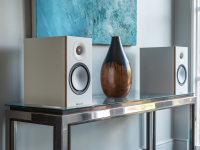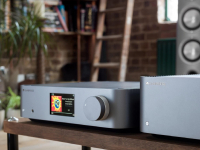
Today we take a look at music on the go and how a simple upgrade can make the world of difference.
When talking about playing music from their small laptop, people have visions of a tinny sound emanating from two tiny speakers, amounting to a very low quality audio experience. In some ways you would be correct: laptops aren’t made to sound good. Even brands geared towards the music industry have soundcards costing no more than a few pounds to make.
The quickest, easiest way to improve quality is to use your laptop’s headphone socket. Plug in a 3.5mm-jack-to-phono and connect the other end into your hi-fi. This improves things slightly, although the soundcard in the laptop probably wouldn’t be doing your music any justice.

Cambridge Audio – DAC XS
This is where a headphone/laptop DAC comes in to the story. Its sole purpose is to disengage that cheap soundcard in your laptop and become the system’s main soundcard itself. A dedicated DAC (or Digital to Analogue Converter) is built specifically for sound. Decoding that all important digital audio information is what it does well. Unlike the laptop itself, it’s not made to do homework, display pictures of your holiday or play DOOM; it’s designed to take the audio from your laptop and deliver it to your ears with much better sound quality than those built-in soundcards could ever provide.
The DACs in question plug into the USB, which means they are usually self-powered and have the standard 3.5mm connector for headphones, or a cable to your hi-fi.
A feature sometimes found is a dedicated volume control. Models like the Cambridge Audio XS also feature a gold-plated headphone socket for a better electrical connection to whatever is being plugged in. A green light lights up on the front of the unit as soon as an audio source is detected. After extensive listening tests (using a Macbook Pro as a source), the unit did remarkably well against the internal soundcard. In fact, it obliterated it; the sound was more expansive, the dynamics were very taught, punchy. Not surprising is Cambridge Audio’s claim that it delivers ten times the power output of an average laptop soundcard. It gave the track I listened to a new lease of life. A very well rounded effect; sounding very natural with a lot more treble detail present. Cymbals sounded much better and more realistic. Vocals were well placed and sounded so much more lifelike. The Cambridge Audio DAC XS powers headphones remarkably well, maintaining total sound authority and control.

AudioQuest – Dragonfly V1.2
Also available is the AudioQuest Dragonfly V1.2. Much like the Cambridge Audio unit, this is a USB DAC, a headphone amp and a preamplifier. We found, under scrupulous test, this could also power the toughest headphones to drive. The AudioQuest was also tested with the same Macbook Pro. Upon plugging the unit in to the USB port the dragonfly logo lit up, indicating the unit is active. The Dragonfly was automatically detected and installed, just like the DAC XS. The Dragonfly was a lot more forward, with immense detail. The sound was very powerful, and very punchy. The amplification of this unit is not laid back at all; it plays music how it was intended with no punches pulled. It seemed to drive the headphones with more power than the Cambridge Audio. I would not say the forwardness of this unit was due to an upped treble response, but should be accredited to the power of the unit. Bass was full and punchy and seemed to have a more impressive clarity. It seemed able to reach higher volumes than than the DAC XS, so if you have a very hard to drive pair of headphones, then this may be an option.
In conclusion, both DACs were very capable contenders, bringing vibrancy and detail to the music. Both were a giant step up from the internal soundcard. The Cambridge Audio unit was a little more natural sounding, bringing slightly better dynamics to the listening experience. The Dragonfly V1.2 was a little more forward in its presentation, bringing details to the forefront. However, it did ever-so-slightly err on the fatiguing side (on prolonged listening).
At Richer Sounds we have a range of DACs in store and would love to show you what they are capable of. Why not bring your favourite music and laptop to hear for yourself how much a DAC can dramatically change your listening experience?
Author – David, Norwich store





